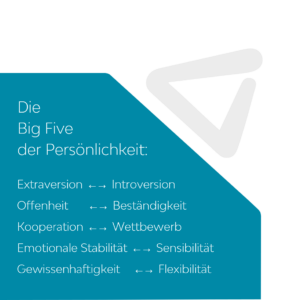

Personal profiling is a procedure that combines scientifically based instruments with an appreciative, future-oriented approach. Be it hiring, internal (promotion), transfers or even outplacement scenarios: Our goal is to provide both candidates and companies with the best possible support in personnel decisions at all times and to give them a positive perspective.
Our basic toolset consists of five well-founded and proven test procedures that can be adapted to the decision-making situation as required in order to accurately determine potential, abilities, motives and personality traits. With every personnel decision, the following questions resonate with the affected candidates and representatives of the organization: Who am I or who is this person? What can I or what can this person do at the moment? What do I want or what is driving this person? And what is possible in the future as the environment and requirements change?
We find the answers via our customized personnel profiling processes. Our seven-step approach is coordinated individually with the client, whereby we attach importance to defining a forward-looking procedure that is comprehensible and constructive for all parties involved.
The process delivers an optimal result when there is a consensus of findings that ultimately leads to a consensual decision that is shared by all parties. But even in the case of differing findings or wishes, this approach ensures comprehensible decisions with transparent criteria that are communicated in a spirit of partnership.
The LPP is based on the Big Five as the best-known standard model for capturing and representing personality. In addition to the five main dimensions of personality, the proficiencies of 30 facets below the dimensions are also recorded, which enables a particularly differentiated depiction of the candidate’s personality. In addition, central motives are recorded. The special feature of the procedure is its meaningful result report (over 30 pages with reflection questions and development recommendations) as well as a forecast of which competencies suit the candidate and which do not.

The LUXXprofile is a standardized psychological test, which is based on the motivation-theoretical approaches of H. Murray, S. Reiss and is substantiated by studies, fulfilling all scientific criteria. It captures 16 basic life motives and measures how strongly they are expressed compared to the population as a whole. This process helps the candidate understand what the drivers are behind their thoughts, feelings and actions and answers the question of what makes a person satisfied and productive in the long run. It’s about what environment a person needs, not how it changes them and their motives.
The ValuesCockpit is a scientific procedure that measures and displays six basic skills as well as individual focal points of a person. Key potentials for professional success in any role are the focus. The basis is a person’s inner values and not, as in many conventional methods, statements about behavior based on a self-assessment by the participant. Therefore, the procedure cannot be manipulated in terms of social desirability and can even be repeated several times for evaluation.
The Clifton StrenghtsFinder is based on the concept of Don Clifton and the empirical studies of the Gallup Institute, whose publications have become world bestsellers. This is about talents, which are defined as naturally occurring patterns of thought, feeling, or behavior. They are among the innate, natural abilities that a person can productively apply and build to strength if invested in. What makes the process unique is the global empirical evidence that shows that a strengths-based approach leads to significantly better performance, outcomes, and life satisfaction.
The affinity profile is based on Manuel Schuchna’s affinity model and represents a reinvention in the world of personnel diagnostics. In this model, the term “affinity” includes the combination of competence motivation and ability potential. Three types of affinities are distinguished: topic affinities, work phase affinities, and complexity affinities.
The special feature of the procedure is that the affinity model is deliberately distinguished from the usual potential diagnostics, which is purely focused on personality traits. For this purpose, the focus is on subject- and topic-specific personnel diagnostics. From the profiles obtained, forecasts and recommendations for action can be derived for the suitability of persons for subject- and topic-specific fields of activity as well as working methods.
In the case of specific requirements for target groups such as executives or project managers, etc., as well as specific contexts such as recruiting, restructuring or separation processes, we use further target group or needs-oriented instruments.
Contact us and we will develop your individual approach and toolset for your personal profiling based on your specific situation and needs.
With our solutions, we have found paths to success for future people companies. We use digital tools for our work, but focus on people and their development. We develop talent and managers vertically (personality) rather than horizontally (skillset). Our diagnostic methods are mature, valued and form the starting point for tailor-made development concepts. Find unique solutions by clicking on the terms below.